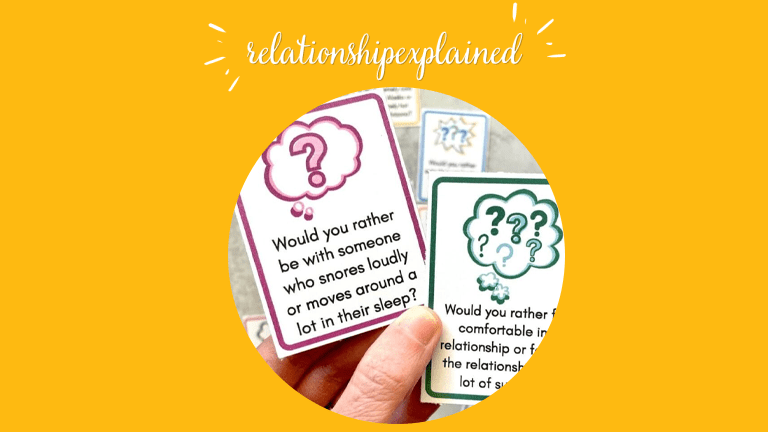My Boyfriend Doesn’t Communicate When We Are Apart
The reasons why your boyfriend doesn’t communicate when you are apart can vary, including fear of vulnerability, lack of communication skills, busy schedules, or other concerns. Understanding these factors can help address the issue and find ways to improve communication in your relationship.
It is a well-known fact that effective communication is the lifeblood of any healthy relationship.
Good communication provides a vital connection even when physical distance separates people. However, when a partner fails to communicate during periods of separation, it can stir up feelings of frustration and uncertainty.
In this compelling topic, we explore the challenges faced by individuals whose boyfriends struggle with communication in long-distance or time-apart scenarios. We delve into the impact it has on emotional intimacy, trust, and overall relationship satisfaction.
By examining potential reasons behind this behavior and suggesting practical solutions, we aim to help those in similar situations foster healthier and more open lines of communication with their partners.
10 Reasons Why Your Boyfriend Does Not Communicate When You Are Apart
1. Fear Of Vulnerability
Many men struggle with expressing their emotions or communicating openly when they are away from their partners. They might fear appearing weak or needy, leading them to withhold their thoughts and feelings. This fear of vulnerability can prevent them from initiating or engaging in meaningful conversations, resulting in limited communication during periods of separation.
Your boyfriend may prefer to keep his emotions to himself rather than risk being judged or rejected. That will subsequently hinder the development of emotional intimacy and connection when you are not physically together.
2. Lack Of Communication Skills
It is possible that your guy may have limited or poor communication skills, making it difficult for him to express himself effectively. He might find it challenging to articulate his thoughts or put his emotions into words, leading to a lack of communication when you are apart.
Furthermore, he may struggle with finding the right words or expressing himself clearly without causing any hurt feelings. That can create frustration or discomfort, causing him to stop talking with you altogether.
3. Busy Schedule Or Competing Priorities
If your boyfriend has a busy schedule or multiple commitments, he may struggle to find time to strike up a conversation with you when you are apart. Work, studies, or personal responsibilities can consume his time and energy, leaving little room for maintaining consistent communication.
In this situation, he might feel overwhelmed or preoccupied with all his other tasks, resulting in communication gaps or sporadic interactions. After all, the demands of daily life can sometimes take precedence over nurturing communication, leading to a lack of regular contact when both of you are apart.
4. Distancing As A Coping Mechanism
In some cases, your boyfriend might resort to emotional distancing as a way to cope with the challenges of being apart. He may create this emotional distance to protect himself from the pain of missing you or to maintain a sense of independence.
By detaching emotionally, he may reduce his reliance on communication and limit his engagement, resulting in decreased communication frequency and depth. While it may sound a bit counterproductive, this might actually help him to cope with the emotional strain of being physically separated from you.
5. Different Communication Preferences
It might be possible that your boyfriend has different communication preferences compared to yours. He may prefer less frequent or more concise conversations, while you may desire more frequent and lengthy exchanges.
This difference in communication styles can create a mismatch in expectations and lead to reduced communication. If his preferred mode or frequency of communication does not align with yours, it may result in misunderstandings or frustrations, leading to decreased motivation to communicate when you are apart.
6. Lack Of Technological Proficiency
While they are relatively less in number in these modern times, there exist some individuals who might struggle with technology or have limited proficiency in using communication tools. If your boyfriend is not comfortable with digital platforms or experiences technical difficulties, it can hinder his ability to engage in regular conversations.
Besides, technical issues, such as poor internet connection may also contribute to his lack of communication when you are apart. In such situations, your boyfriend may not be able to get in touch with you, even if he wants to.
7. Personal Insecurities
Your boyfriend may have personal insecurities that affect his willingness to communicate when you are apart for extended periods. He might harbor self-doubt or fear of inadequacy, which can hinder his confidence in initiating conversations or sharing his thoughts.
These insecurities can make him hesitant to reach out, fearing rejection or judgment. He may prefer to stay silent rather than risk exposing his vulnerabilities, leading to limited communication during periods of separation.
8. Emotional Exhaustion
Being physically apart from a relationship can be emotionally draining. If you have been apart for quite a bit of time, it might lead to your boyfriend experiencing emotional exhaustion. In other words, the strain of missing you or dealing with the challenges of long distance can deplete his emotional energy, leaving him with limited motivation to engage in communication.
If that’s the case, his capacity to communicate effectively during separation will naturally be affected. Besides, he may need time to recharge emotionally, which can take some time. That will lead to decreased communication efforts during periods of separation.
9. Previous Negative Experiences
Negative experiences in relationships, such as betrayal or conflict, can leave a lasting impact on an individual’s communication patterns. If your boyfriend has faced hurtful experiences in the past, he may be reluctant to communicate when you are apart.
The fear of history repeating itself or the lingering wounds from previous relationships can contribute to his hesitance in reaching out or sharing his feelings. This can be considered a protective measure that prevents him from feeling overwhelmed, especially if he has entered a new relationship recently.
10. Fear Of Interrupting Your Routine
In some cases, your boyfriend may hesitate to communicate when you are apart out of a fear of disrupting your routine or causing inconvenience. He might worry that reaching out at certain times or engaging in lengthy conversations may bother and interfere with your work, personal life, or other commitments.
This fear of being perceived as a burden or interrupting your daily activities can make him reluctant to initiate communication. Consequently, he may choose to limit his interactions to avoid potentially inconveniencing you, leading to a lack of communication during periods of separation.
What Steps Can You Take To Improve Communications With Your Boyfriend When He Is Apart?
There are several approaches you can take to address the situation and improve communication in your relationship.
1. Initiate Open Conversations
Taking the initiative to address the issue directly is an essential step in improving communication. Start by setting aside dedicated time for a calm and honest conversation with your boyfriend. It is a good idea to express your feelings honestly and concerns using “I” statements to avoid sounding accusatory or confrontational.
Let him know that open communication is crucial for maintaining a healthy relationship. Also, encourage him to share his perspective and actively hear his concerns. By creating a safe space for dialogue, you can foster understanding, build trust, and encourage him to open up about his reasons for not communicating when you are apart.
2. Understand His Communication Style
Since every individual has their own unique communication style, you will need to take the time to understand your boyfriend’s preferred way of staying connected. Some people may prefer regular check-ins, while others may prefer more intermittent communication.
Discuss with him his expectations for communication during periods of separation and try to find a compromise that respects both of your needs. By understanding and accommodating his communication style, you can establish a more harmonious approach to staying connected that works for both of you.
3. Explore The Underlying Reason
Before jumping to any conclusions, it is important to delve deeper into the problem to gather all the details. This essentially means that you will need to determine the underlying reasons behind your boyfriend’s reluctance to communicate when you are apart.
By understanding the root causes, you can approach the situation with empathy and in a healthy way and address any deeper concerns that may be affecting his communication behavior. Encourage him to share his feelings and concerns, and assure him that you are there to support him.
4. Establish Clear Expectations
Clearly communicate your needs and expectations regarding communication during periods of separation. Explain to your boyfriend why talking is important to you and how it contributes to maintaining a successful relationship. You can also discuss the frequency, mode, and depth of communication that you desire.
However, it’s crucial to find a balance that respects both of your needs. Be open to compromise and flexibility, as rigid expectations can create pressure and resistance, and that might rub him the wrong way.
But by establishing clear expectations and finding common ground, you can create a shared understanding and give your boyfriend a clearer sense of how important communication is to you. It’s important that both of you feel heard in the relationship!
5. Encourage Gradual Steps
If your boyfriend feels overwhelmed or uncomfortable with extensive communication, suggest taking gradual steps. You need to understand that everyone has different comfort levels when it comes to opening up and sharing emotions.
Starting with small, manageable interactions can help him ease into communication. For example, you can initiate quick check-ins or share daily updates about your day. Then, you can gradually increase the level of conversation to help him feel more at ease. Encourage him by expressing appreciation for his efforts and providing positive reinforcement when he does initiate or respond to communication.
6. Provide Reassurance
You should reassure your partner that you value his thoughts and feelings. This will make it clear that you are open to listening and understanding without judgment or criticism. Show empathy and let him know that you are there to support him through any challenges he may be facing.
Creating a safe and non-threatening environment can encourage him to share more and feel more comfortable expressing himself. By providing reassurance, you can help alleviate any fears or insecurities that may be hindering his willingness to communicate.
7. Focus On Quality Over Quantity
Rather than solely emphasizing the frequency of communication, shift the focus to the quality of your interactions. Encourage meaningful conversations where both of you can feel connected by sharing deeper thoughts, emotions, and experiences.
So, instead of engaging in superficial small talk, aim for more substantial discussions that foster a sense of emotional intimacy. This approach can be particularly helpful if you have limited opportunities for communication. By prioritizing quality over quantity, you can make the most of the time you do spend communicating and create more substantial connections even with limited interactions.
8. Seek Couples Therapy
If the issue persists and communication remains a significant challenge, consider seeking the assistance of a couples therapist or relationship counselor. A professional can provide guidance, help facilitate communication, and assist in addressing any underlying issues.
Therapy sessions offer a neutral and supportive space for both of you to express yourselves and work together to improve communication in your relationship. A therapist can provide insights, tools, and strategies tailored to your specific circumstances, enabling you to navigate the challenges and find effective ways to communicate and connect.
Conclusion
Lack of communication in a relationship doesn’t necessarily mean that your partner is no longer interested in you. However, you need to approach this problem with calmness and a level head. If you don’t, the issue will become even more complicated and lead to conflict.
Your partner may avoid talking to you for a variety of big or small reasons. And if you are feeling insecure about it, then the best you can do is initiate conversations to understand his concerns.
By exploring the underlying reasons, you can lay the foundation for improved communication in the future. Establishing clear expectations, encouraging gradual steps, providing reassurance, and considering professional help if needed are some potentially useful strategies. If you wish, you can also talk with a mutual friend or family member about such an issue.













